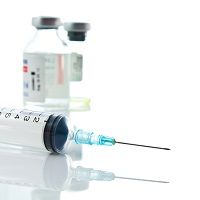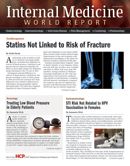Publication
Article
Internal Medicine World Report
STI Risk Not Related to HPV Vaccination in Females
Author(s):
Rates of sexually transmitted infections were unrelated to human papillomavirus vaccination in females aged 12 to 18 years old, according to research published in JAMA Internal Medicine.

Human papillomavirus (HPV) vaccination was not linked to sexually transmitted infections (STIs) in females, which suggests vaccination is unlikely to promote unsafe sexual activity, according to findings published in JAMA Internal Medicine.
Researchers from the University of Southern California compared HPV vaccinated and unvaccinated females ages 12 to 18 years from January 1, 2005 to December 31, 2010 in order to evaluate whether HPV vaccines in females is linked to increases in STI rates. The researchers defined STIs as one or more medical claims for any infection in a given quarter such as chlamydia, gonorrhea, herpes, human immunodeficiency virus (HIV) or AIDS, or syphilis. Then, the researchers compared whether effects varied according to age and prior contraceptive medication use.
The researchers found that in the year prior HPV vaccination — which was found in 4.3 per 1,000 females or 94 out of 21,610 – the rates of STIs were higher compared to age matched non vaccinated females. The rates of STIs increased for vaccinated and non vaccinated groups in the year after vaccination; 147 of 21,610 vaccinated females and 781 of 186,501 non vaccinated females, respectively.
After the analysis, the researchers determined HPV vaccination was not associated with an increase in STIs relative to growth among non vaccinated females. Subsets of females who were aged 12 to 14 years and 15 to 18 years who used contraception demonstrated similar associations.
“We found no evidence that HPV vaccination leads to higher rates of STIs,” the authors concluded. “Given low rates of HPV vaccination among adolescent females in the United States, our findings should be reassuring to physicians, parents and policy makers that HPV vaccination is unlikely to promote unsafe sexual activity.”
In a related editorial, Robert A. Bednarczyk, PhD from Emory University in Atlanta, GA suggested this problem needed to be further researched in order to pinpoint the preferred content and mode of delivery of this information. By better expressing this information, the HPV vaccination rates would likely improve.
“These findings should not come as a surprise to researchers in the field of HPV vaccinology and should serve as continued reassurance that HPV vaccination does not lead to sexual disinhibition,” Bednarczyk wrote. “Addressing this knowledge gap through the development and delivery of information relative to all key partners (adolescents, their parents, and their health care professionals) will be critical in removing the stigma of HPV vaccine in our efforts to fully use this vaccine.”

2 Commerce Drive
Cranbury, NJ 08512
All rights reserved.





